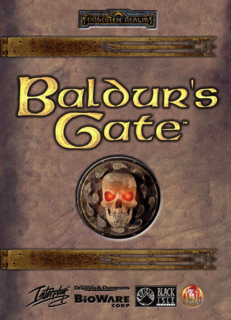If you really enjoy RPGs true to D&D rules and want to find out more about the RPG that really got me gaming...
In fact, after all is said and done, this is probably the game that got me gaming in the first place.
Gameplay:
With a deep, well developed storyline and lots of action in the main quest line, not to mention the numerous side quests, this game remains hard to beat from a pure RPG perspective.
No, it’s not Oblivion, but essentially that is purely because the gameplay is based on an entirely different philosophy, besides all the technological advances in the PC arena over the past nine years of course. Where games like Oblivion tend to be rather open-ended and are more like a FPS when it comes to combat, Baldur’s Gate (and it’s numerous sequels for that matter) all remain completely true to the D&D set of rules – Version 2 in this particular case.
This is probably the biggest point of contention as far as gameplay in the entire Baldur’s Gate universe is concerned, since if you don’t like BioWare’s strict application of D&D rules, you will probably not enjoy this game. Then again, if you do, this will be one of those games you simply must have in your collection and will want to play over and over again – my own case proving the point.
To illustrate the argument, you simply need to look at the way combat is handled in Baldur’s Gate, compared to a game like Oblivion for example. In the case of Baldur’s Gate, the outcome of any combat sequence (turns if you will) are entirely dependent on the application of D&D rules and your character(s) development within that framework. If you are playing a level 1 Paladin for example and come up against a Level 4 or higher character with many spells in his or her arsenal, you will have a pretty tough time surviving the encounter. Your only means of defense will be your armor class and whatever physical weapon you have at that particular point in time. There is very little interaction from your side such as parrying, shielding and slashing as would be the case in Oblivion for example, since these actions are not interactive in the strict application of D&D rules during combat.
What therefore becomes more important in this case is that every combat sequence in Baldur’s Gate almost becomes a mini quest as you attempt to use all the tools and other characters in your party to out-maneuver or out-fox your attacker(s), given the strict D&D rules framework you need to operate in.
It therefore also becomes rather obvious that rapid and well considered character development is a key factor in terms of gameplay within Baldur’s Gate. Taking the Paladin character again, as example, the player needs to put quite a bit of thought into how to develop the character each time he or she has enough experience points to level up. Placing a lot of emphasis on weapon mastery at the expense of new spell abilities (within the character constraints of a Paladin of course) may prove fatal in the end and you may even end up with a completely un-playable character later in the game. The latter is probably why a lot of recent “true to D&D” RPG games give players the option to let the computer recommend character attribute development when it’s time to level up.
As far as the rest of it is concerned, Baldur’s Gate really offers just about as much as one could hope for in 1998, when it was first released. The user interface is simple, straight forward and almost “quaint” by modern standards. It still works very effectively though.
Graphics:
Considering all that has happened over the past nine years, it would be almost unfair to comment as far as this aspect of the game is concerned at this point. Even now, it actually still looks rather cool, albeit a 2D isometric world running at 800x600 resolution!
Sound:
The soundtrack was great in 1998 and still is, not considering the fact that the game makes full use of environmental audio, which was quite a big thing back then.
Value:
You will probably be able to pick up the entire Baldur’s Gate universe for under the price of one new game in the shops by now, and considering the number of hours of gameplay, that must give it a 10 in this department by now.
Who Should Get It:
Anyone who enjoys RPGs where strict D&D rules apply, such as Neverwinter Nights and other similar titles, simply must have this game in their collections.
Who Shouldn’t Bother:
Anyone who enjoys RPGs, but prefer more open-ended gameplay such as in Oblivion for example, will probably be disappointed and may even dislike the gameplay altogether.

